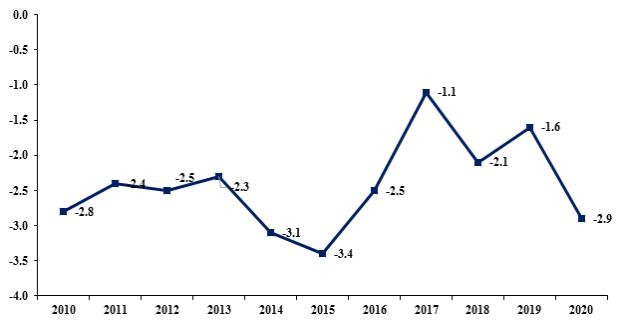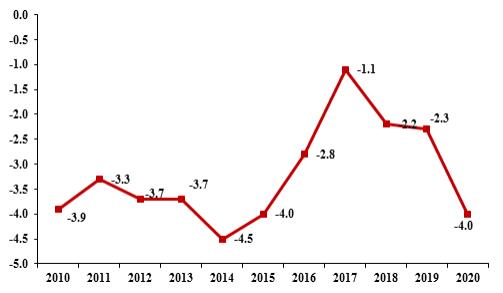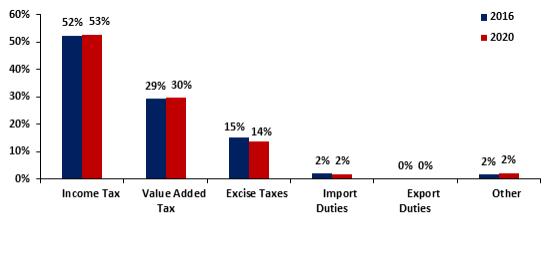THE ECONOMY
COVID-19
Since COVID-19 infections were first reported in December 2019, the COVID-19 crisis has had a significant impact on the global economy. The Mexican economy in 2020 was, and continues to be, adversely impacted and, if the crisis continues for an extended period of time beyond 2020, the Mexican economy may continue to be adversely impacted. For more information on the COVID-19 crisis, its economic impact and the key measures taken by the Government in reaction to the COVID-19 crisis, see “United Mexican States—COVID-19 Crisis” and “Recent Developments—COVID-19 Crisis.”
General
According to World Bank data, the Mexican economy, as measured by 2019 GDP (at current prices in U.S. dollars), is the fifteenth largest in the world. The Mexican economy had a real GDP of Ps. 16,984.8 billion in 2020 and an decrease in GDP of Ps. 762.4 billion between 2016 and 2020, an annual average decrease of 1.0% each year.
The Programa Especial para Productividad y Competitividad 2020-2024 (Special Program for Productivity and Competitiveness 2020-2024) was published in the Diario Oficial de la Federación (Official Gazette) on December 31, 2020. The program is aimed at boosting productivity, development and growth, through greater financial inclusivity, infrastructure development, greater inclusion of women and youths in labor, boosting corporate competition and promoting the rule of law, among other means. The program has specific goals and measurement parameters to evaluate compliance and successful implementation and is mandatory for all government agencies, units and entities of the Federal Public Administration.
The Role of the Government in the Economy; Privatization
Over the past several decades, the Government has taken steps to increase the productivity and competitiveness of the economy through deregulation, privatization and increased private-sector investment. These measures include: (1) constitutional amendments and legislation allowing the Government to permit private participation in railways and satellite communications; (2) legislation permitting Mexican private-sector companies to engage in the storage, distribution and transportation of natural gas; (3) the privatization of airports, seaports and highways; (4) civil aviation legislation allowing private companies to secure thirty-year concesiones (concessions) to operate commercial air transportation services within Mexico; and (5) constitutional amendments and legislation allowing the Government to permit private sector participation in oil extraction and the production and distribution of electricity.
As of December 31, 2020, there were 299 Government-owned or controlled entities. These entities include: (1) empresas de participación estatal mayoritaria (enterprises that are majority-owned by the Government); (2) organismos descentralizados (decentralized instrumentalities); (3) fideicomisos públicos (public trusts); and (4) empresas productivas del estado (productive state-owned companies), including their empresas productivas subsidiarias (productive state-owned subsidiaries). Majority-owned enterprises include banking development institutions, such as the Banco del Bienestar, S.N.C. (Bank of Wellbeing), an institution that promotes savings, use and promotion of technological innovation and financial and gender inclusion to individuals and companies that have limited access to credit. The decentralized instrumentalities are independent legal entities that generally have technical, operational, budgetary and managerial autonomy, such as the Instituto para la Protección al Ahorro Bancario (Institute for the Protection of Bank Savings, or IPAB), which seeks to guarantee bank deposits, mainly for small and medium-sized savers, and provide solutions to banks with solvency issues, contributing to the stability of the banking system and safeguarding the national payment system. Public trusts are public entities created to provide a public good or right in the service of a defined objective, such as the Fondo Nacional de Fomento al Turismo (National Fund for Tourism Development), which seeks to identify sustainable investment projects in the tourism sector oriented toward regional development, job creation, economic development, social welfare and the improvement of quality of life. Productive state-owned companies are companies that are entirely owned by the Government. Mexico’s productive state-owned companies are PEMEX, which, through its productive state-owned subsidiaries, engages in the exploration, production, industrial transformation, logistics and marketing of hydrocarbons, and CFE, which, through its productive state-owned subsidiaries, promotes the efficient operation of the electricity sector and open access to the Red Nacional de Transmisión (National Transmission Network) and Redes Generales de Distribución (General Distribution Networks).
During recent years, Congress has adopted a series of laws that increase the scope of private and foreign participation in key sectors of the Mexican economy. For example, FONADIN serves as the financial platform for developing infrastructure projects with the participation of the public and private sectors. In addition, under the Ley Federal de Austeridad Republicana (Federal Republican Austerity Law), the Government prioritizes the use of public tender processes for the award of purchase, lease and service contracts. For more information on measures to increase the scope of foreign and private participation in the petroleum and petrochemicals and electric power sectors of the economy, see “The Economy—Principal Sectors of the Economy—Petroleum and Petrochemicals” and “The Economy—Principal Sectors of the Economy—Electric Power.”
The Acuerdo para el Fortalecimiento Económico y la Protección de la Economía Familiar (Agreement for Economic Strengthening and Protection of the Economy of the Family) aims to strengthen the domestic market in Mexico with a focus on protecting the economic well-being of Mexican families, increasing investment and maintaining job creation, economic growth and competitiveness.
D-40



